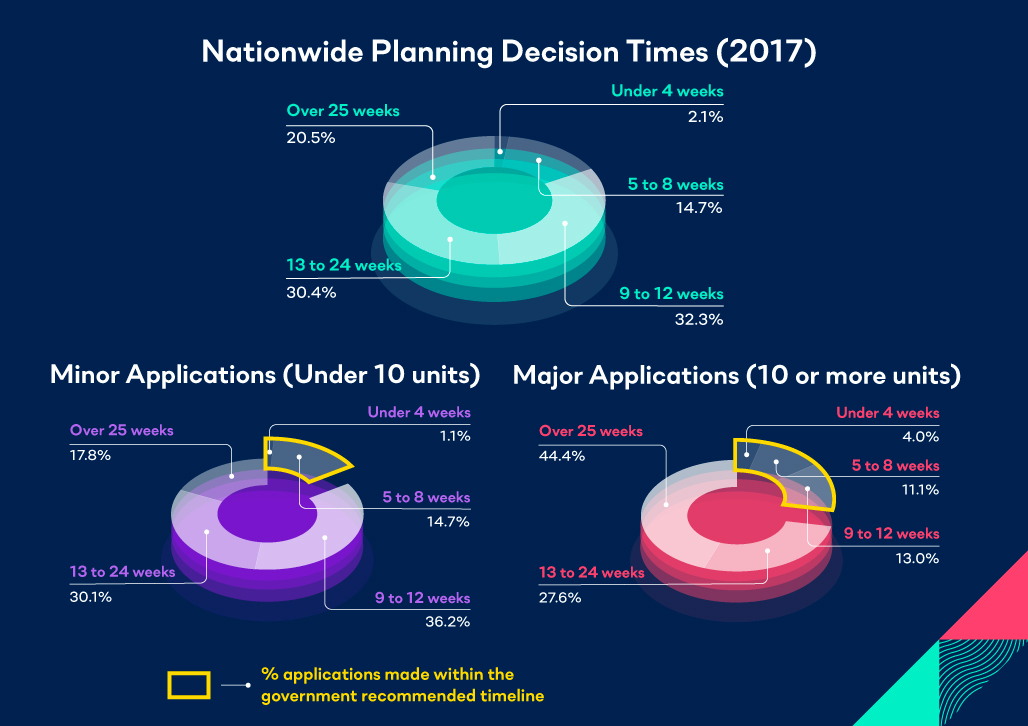Housing Minister Esther McVey recently hinted at a plan to force councils that take too long processing planning applications to refund the associated fees. There weren’t any specifics, but she did say:
“We are looking at some of the things we can do to make planning smoother, faster, more effective.”
We’ll see what happens, but in truth, the idea of planning application refunds is nothing new. In fact, it’s already standard practice.
The government's statutory time limits say that applications should take:
- 8 weeks for minor applications (those nine units and under)
- 13 weeks for major applications (those of ten or more units)
- 16 weeks if an Environmental Impact Assessment is needed
At most, applications should take 26 weeks to comply with the ‘planning guarantee’. If they take longer than this, then the developer could be issued a refund.
So while we don’t know exactly what the changes will be, I wanted to dive into the numbers on how long different areas currently take for planning applications. That way we can see the scale of the issue, and what impact a change might have.
Before we jump in to the data...
We've compiled the top 10 Local Authorities for both major and minor planning application approvals in a handy downloadable graphic just for you!
Nationwide planning data – the numbers
The last complete year for planning applications data is 2017 (it looks like there are still some applications from 2018 pending, so we’re erring on the side of caution) – so let’s use that to get a nationwide baseline.

If we exclude certain things like commercial planning applications, as well as applications for amends to a single property (things like loft conversions, which aren’t as relevant if we’re looking at site builds and might skew the results) there were just over 29,600 decisions across 326 planning authorities.
The results?
All decisions:
- 17% took under 8 weeks
- 20% took over 24 weeks
For minor application decisions more or less match with this (which makes sense as they account for just over 80% of all planning decisions in 2017):
- 16% took under 8 weeks
- 18% took over 24 weeks
However for major application decisions the results were a bit different:
- 15% took under 8 weeks
- 44% took over 24 weeks
This makes sense – major applications are more complex and have more of an impact on the community, so they’ll naturally take longer to process.
A bit more about the data:
- For minor applications, just over 15% of all decisions come under the govt’s limit of 8 weeks....
- Yet for major applications, just under 30% of decisions come under the 13 week target.
- From this it seems that authorities need more help with minor applications than major applications.
- However – for major apps, over 40% of all decisions seem to blow past the guarantee of 26 weeks.
- If refunds were to be enforced, then almost half of all large development applications would be refunded.
Also, just for fun, we took a look at Esther McVey’s constituency of Tatton’s LPA of Cheshire East – which came in pretty much on the average, with 14% of decisions in under 8 weeks and 19% in over 24 weeks.
So, a pretty standard result.
The differences across authorities
Those are the averages, but there are also some pretty interesting outliers.
For instance, if we look at the authorities with the most applications taking over 24 weeks, we find the authorities with the highest percentages are:
- Broxtowe – 61%
- High Peak – 56%
- Arun – 48%
Compared with that nationwide average of 20% of decisions taking over 24 weeks – these local authorities have rates that are more than two times the average.
What about fast turnaround – which ones would have little trouble from the refund hammer of Esther McVey?
Well, if we look at the local authorities with the most decisions in under eight weeks (compared with that national average of 14%), we find the top performers are:
- Harrow – 61%
- Wolverhampton – 59%
- Redbridge – 59%
So the faster ones are better, right? Well, it’s not that simple...

What factors impact planning turnaround times?
There are a whole bunch of reasons that a local authority may be slower at processing applications – none of which necessarily reflect ‘quality’.
Things like...
Number of applications
The more applications, the higher the workload, the slower the turnaround time.
That top performer, Harrow? In our data, they only had to deal with 83 decisions in 2017.
Although one interesting case study we spotted was Ealing. They processed 500 decisions, and they still managed to turn 43% around in under eight weeks. So there’s more to it than meets the eye.
Application volume change on the previous year
If a local authority faced a sudden change in demand with no equivalent change in resourcing, the turnaround time is bound to be affected.
Let’s look at Arun, one of our ‘slow’ authorities. From 2016 to 2017 (the year we tracked) they saw the number of applications go up by a fifth.
So, maybe it’s forgivable?
The theory holds weight at the other end – when we look at Redbridge and Wolverhampton, two of the ‘fast’ local authorities, they saw around a 25% decrease in the number of decisions processed.
But it’s not even that simple.
Ealing saw a 27% increase in its number of decisions, and turned most of them around in under eight weeks. Harrow faced an increase of 30%, and did the same.
So… it’s all complicated.
Approval/rejection rates
Maybe authorities can make faster decisions if they are more able to rubber stamp applications? Like if somewhere deals with planning applications in a national park – they can mostly reject planning applications, so would naturally have a faster turnaround time.
When we look at ‘fast’ local authorities this seems to be the case.
Our three top performers have incredibly high approval rates:
- Wolverhampton 92% of applications
- Redbridge 99% of applications
- Harrow 100% of applications
But then, if we look at the slower end, there seems to be little pattern between the approval rate and the time.
So it’s not that simple either….
Decision-to-committee rate
Sometimes planning officers can make decisions for themselves. This is known as delegated powers, and happens on minor applications as long as there are fewer than three objections.
Other times they go to committee, which will take longer. Just missed a committee meeting? Well you can expect to add a month of waiting around until the next one. And if you don’t make the cut on that one either… well, suffice to say there can be a lot of waiting around, and it’s not the local authority’s fault at all.
If the LPA's criteria and circumstances are such that most decisions get kicked to committee - then no matter its resources or how efficiently it's run - it would still fail to hit its targets.
If the LPA's criteria and circumstances are such that most decisions get kicked to committee - then no matter its resources or how efficiently it's run - it would still fail to hit its targets.
So even that isn’t all that simple.

Are refunds really a solution?
With all of these complex factors that are entirely out of the planning department’s control, refunds might be the wrong way to go. They aren’t being punished for their own inefficiency, they’re being punished on a kind of arbitrary timeline.
It’s not likely to help the problem. In fact, it’ll probably just make the situation worse.
If cash-strapped planning departments have to give refunds, they’ll be even more cash strapped. That means an overstretched department becomes even more overstretched.
Senior (more expensive) planners are replaced with more junior (cheaper) people. There are more mistakes. Fewer resources. Decisions take longer. Which means more refunds...
It becomes an endless cycle of decline. And no one is happy.
With any new policy there’s also a risk of bad actors gaming the system. Some mischievous developers might start timing their applications, working together, in order to overwhelm a planning department in the hope of a refund. They could make their planning applications excessively complex so it takes longer to process.
Add in that, for the cash-strapped councils, planning departments are one of the few fee-earning departments and without them, everyone gets poorer.
Faster decisions, or better decisions?
To tackle the housing crisis, we need better planning decisions. We need to help planners share everything needed to local authorities in the best way, the first time around. So that when they do get a decision, it’s the best decision – for everyone in the process.
Sure there’s a lot we can do to improve the process. But this involves things like new tech to help make the process more efficient, not punishing planning departments for making the right calls.
That’s what we’re doing with LandEnhance. We’re making it easier for planners, which just so happens to make the process faster for developers.
Know someone who could benefit from some much-needed PlanTech? Send ‘em our way…
We even offer a £250 voucher for each referral you send our way who signs up.


